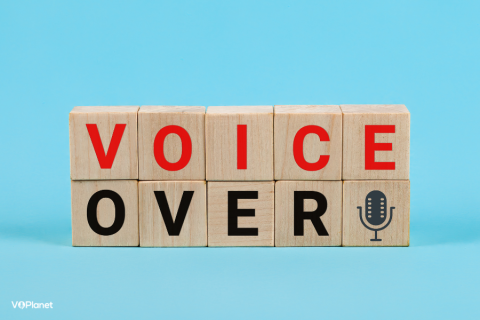
Exploring the Different Ways to Spell Voice Over
If you’re stepping into the world of voice overs, you might have stumbled upon a peculiar question: Is it "voice over," "voiceover," or "voice-over"? Don’t worry – you’re not alone in this linguistic maze.
Whether you’re exploring voice acting for the first time or brushing up on industry terms, understanding the nuances between these variations can help you navigate conversations and searches with confidence. And fear not, the grammar police won’t come knocking for your choice. Let’s demystify which form of voice over reigns supreme (or if they all do!).
How Do You Write the Word Voice Over?
The primary forms you'll encounter when writing the word voice over are "voice over," "voiceover," and "voice-over." Each version is widely accepted in different contexts, and the choice often comes down to personal preference.
When it comes to writing "voice over," there's a bit of flexibility that allows for different variations. According to the Merriam-Webster dictionary, all three forms of "voice over" – "voice over," "voiceover," and "voice-over" – are recognized and considered correct. This reflects the flexibility and evolution of language usage, accommodating different preferences and contexts.
Is Voice Over One Word or Two?
"Voice over" as two separate words is a straightforward and widely recognized way to describe the narration or commentary that accompanies a video, film, or presentation. This form is favored in casual writing and is easily understandable across different audiences.
"Voiceover," written as a single word, is another common variation. It's often used in industries like broadcasting, advertising, and entertainment. The Associated Press (AP) Stylebook recommends “voiceover” as one word, not two separate words. This form is concise and efficient, making it popular in headlines, scripts, and industry-specific communication.

Does Voice Over Have a Dash or Hyphen?
While the use of "voice-over" with a hyphen is less common in casual or everyday speech, it is valued in contexts where precise language and adherence to formal writing conventions are necessary. In academic papers, technical documentation, and formal reports, "voice-over" with a hyphen is sometimes preferred to meet grammatical standards and ensure precision in communication. Contracts, agreements, and legal documents may also use "voice-over" with a hyphen to maintain clarity and avoid ambiguity in terms of services or obligations related to voice narration or recordings.
What Is the Abbreviation For Voice Over?
The abbreviation "VO" is widely recognized and used within the voice over industry to refer to "voice over." It serves as a convenient shorthand in various contexts, from scripts and project briefs to discussions among voice actors, producers, and clients.
Voice actors often use "VO" when referring to their profession or when discussing specific voice over projects they are involved in. Producers, directors, and casting agents commonly use "VO" in casting calls, project descriptions, and communications related to voice over work. In marketing and advertising contexts, "VO" may appear in scripts, storyboards, and production notes to indicate where voice narration is required.
At VOPlanet, we embrace the abbreviation "VO" as part of our business name. VOPlanet is dedicated to empowering voice actors and promoting the art of voice over. Our name reflects our passion for connecting talented voice actors with exciting opportunities in the voice over industry.
Which Form of Voice Over is Preferred for SEO?
When considering which form of the word "voice over" is best for SEO (Search Engine Optimization), it's important to understand the nuances and implications of each variation.
Writing "voice over" as two separate words ("voice" and "over") can be beneficial for SEO because it matches natural language queries that users might type into search engines. It allows for flexibility in targeting both specific and broader search intents related to voice over services. Using "voiceover" as one word is also effective for SEO. It’s concise and may match particular search queries. The hyphenated form, “voice-over” is less common in everyday searches and is primarily used when targeted technical or formal contexts.
Each variation of the term voice over serves its purpose in the diverse landscape of voice acting and production. The flexibility in usage allows for adaptation to different contexts, from casual conversations to formal scripts and industry standards.
In your own writing, feel free to choose the form that best suits your style and purpose. Whether you opt for "voice over," "voiceover," or "voice-over," what matters most is clarity and consistency within your content.
You may also be interested in: What Do You Call Someone Who Does Voice Over?
You may also be interested in: Can I Do Voice Over Work From Home?
VOPlanet is a global marketplace that connects freelance voice talent with creators, casting directors and other voice buyers. You can post a voice over job for free and get auditions from our professional voice team.




 VOPlanet Blog
VOPlanet Blog